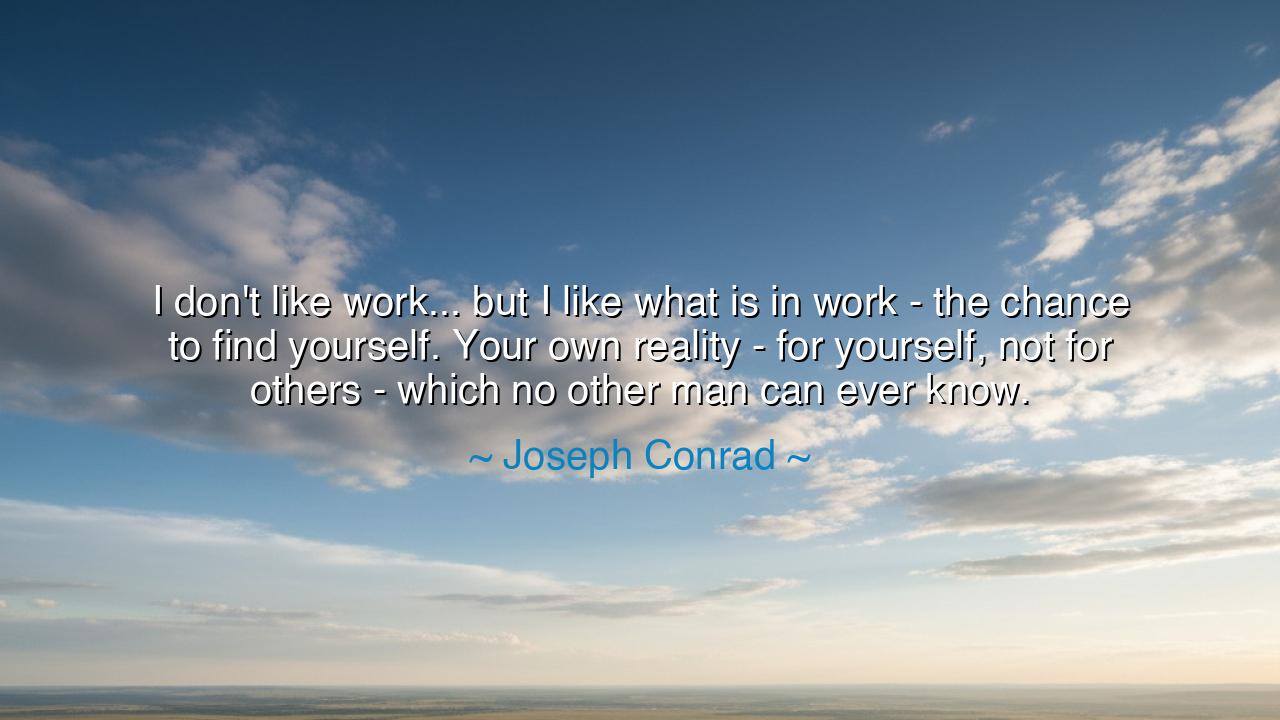
I don't like work... but I like what is in work - the chance to
I don't like work... but I like what is in work - the chance to find yourself. Your own reality - for yourself, not for others - which no other man can ever know.






Host: The room feels quiet, the soft light from the lamp casting a warm, inviting glow across the space. Outside, the world has quieted as the evening takes over. Jeeny sits on the couch, her legs tucked beneath her, lost in thought. Jack, standing near the window, looks out at the darkening world, clearly deep in contemplation. The calm atmosphere feels like the perfect backdrop for a conversation that may uncover something deeper.
Jeeny: “Jack, I came across a quote from Joseph Conrad today that really made me pause,” she says softly. “He said, ‘I don’t like work... but I like what is in work — the chance to find yourself. Your own reality — for yourself, not for others — which no other man can ever know.’ What do you think about that?”
Jack: He turns to face her, a thoughtful expression on his face. “That’s an interesting perspective. It’s almost like he’s saying that work, in itself, isn’t something we should necessarily love, but it’s in the act of working that we get to discover something deeper about ourselves — our own reality. It’s the process of work that allows us to explore our identity, to uncover what’s truly important to us, not just what’s expected of us by others.”
Jeeny: “Exactly. It’s like work, while not inherently enjoyable, becomes a path to self-discovery. In the act of doing something, even something we might not enjoy, we find parts of ourselves that would remain hidden otherwise. The key isn’t the work itself, but what it reveals to us — who we are, what we value, and how we relate to the world.”
Host: The light in the room seems to soften, as if their conversation is deepening, uncovering something more profound about the role of work in shaping personal identity. Jeeny’s words suggest that the value of work lies not in the external outcomes, but in how it helps us connect with our inner truth, our own reality. Jack stands still for a moment, reflecting on how often we approach work as a means to an end, rather than a process of self-exploration.
Jack: “So, it’s about seeing work not just as something we do for external rewards or expectations, but as something that can offer us a chance to understand ourselves more deeply? We might not love the tasks or the conditions, but we can still find meaning in them if we allow them to show us something about who we really are?”
Jeeny: “Yes, exactly. The real gift of work is in the personal growth that comes from it. When you’re immersed in it, you’re not just doing tasks for others, but you’re learning about your own limits, your passions, and your purpose. It’s a space where you can engage with the world in a way that’s authentic, even if the work itself doesn’t seem exciting.”
Host: The air in the room feels quieter now, as if the conversation has turned inward, revealing a deeper understanding of the role of work in personal identity. Jeeny and Jack reflect on the idea that work is more than just a means of survival or social validation — it’s a pathway to understanding our true selves. Joseph Conrad’s quote serves as a reminder that, even in the most mundane or unenjoyable tasks, there is an opportunity for self-reflection and growth.
Jack: “I like the idea that work is a way to find yourself. It makes me think that maybe the value of work isn’t in how much we achieve, but in how much we learn about ourselves through it. Even if the work is hard or unglamorous, it can still bring clarity about who we are and what we truly want.”
Jeeny: “Exactly. Work can be a way to engage with life and our own reality, even when it’s not easy. It’s not just about getting something done — it’s about what we discover about ourselves along the way. The chance to find meaning and purpose, to become more in tune with who we are, is what makes work worth it.”
Host: The room feels still, the weight of their conversation settling in. Jeeny and Jack sit together, reflecting on the idea that work, while often challenging or unenjoyable, holds within it the potential for self-discovery. Joseph Conrad’s words remind them that work is not just about external outcomes, but about uncovering the truths within ourselves — a personal journey that no one else can walk for us.






AAdministratorAdministrator
Welcome, honored guests. Please leave a comment, we will respond soon